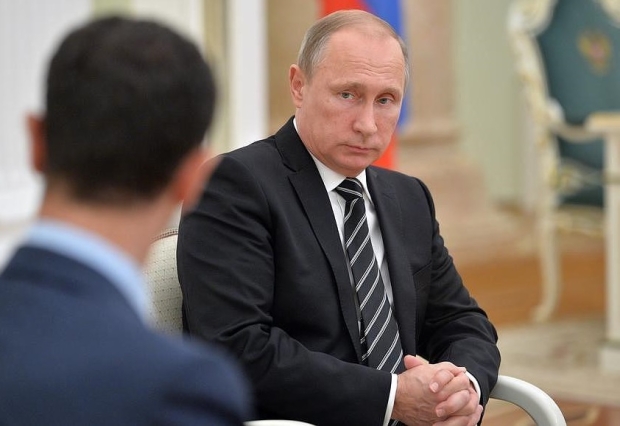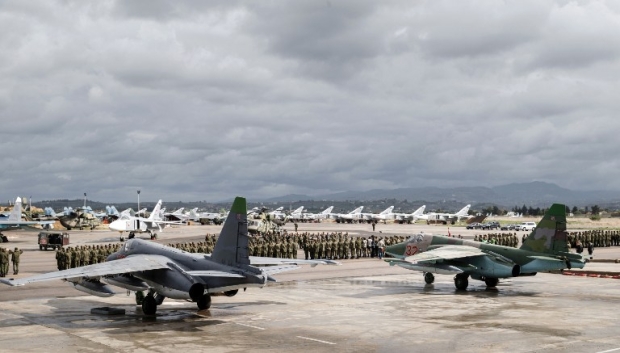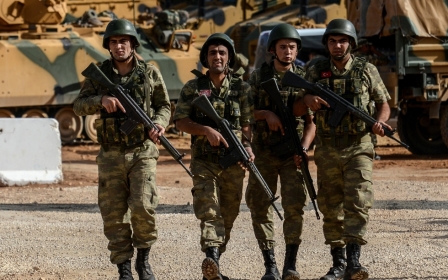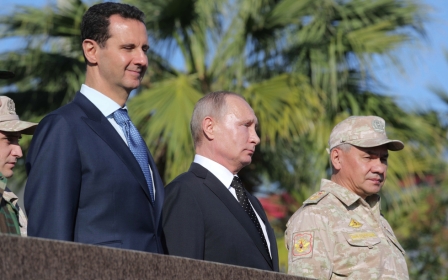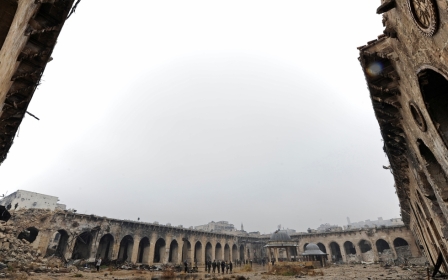The Syrian battlefield is beginning to resemble the Lebanese civil war and Damascus is dominating
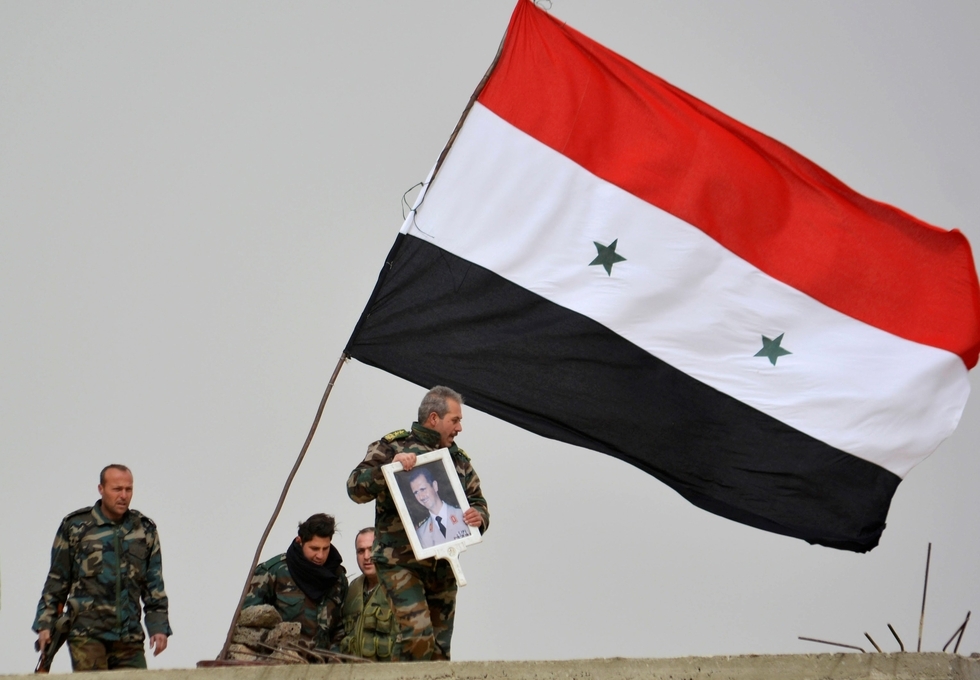
The downing of an Israeli F-16 last weekend brought back memories of the Lebanese civil war which pitched Soviet advisers embedded with the Syrian Arab Army's air defences against the Israeli Air Force and its proxy forces in Southern Lebanon.
Indeed this was the first time the Israeli Air Force had lost an aircraft since 1982, when Syrian surface-to-air batteries shot down two Israeli planes over the Bekaa Valley.
In the aftermath, the Israeli response was immediate and ferocious in what the Israelis called their biggest attack on Syrian air defence systems since the 1980s.
Middle power rivalries
The myriad of alliances in the Syrian civil war is now beginning to look less like non-state actors but rather like the middle-power rivalries that will pit Israel, Iran, and Russia against each other directly.
There is also an acknowledgment, by the Trump administration and western leaders like French President Macron, that Damascus is more emboldened than it has been since the start of the war, and with the help of Russia, the Syrian military is slowly creeping back to its preeminent position. It is safe to say the Syrian government controls at least 65 percent of the territory.
However Iran's shadow lurks as was proven quite literally when its drone crossed into Israeli airspace, which led to the recent escalation between the Syrian military and the Israeli Air Force. There has been a clear and strategic difference in how the Russians and Iranians see the battlefield as far as their otherwise common strategy of supporting the Syrian government goes.
The Iranians have relied on domestic and foreign militias in addition to their own personnel, while the prime objective of the Russians has been to back the state forces of the government, namely the Syrian Arab Army.
It is almost inconceivable that the Russians would not have been aware of the Israeli attack beforehand as there is a direct hotline between the two parties to make sure that the Russians and the Israelis do not come into direct contact either in the air or the ground.
The Syrians, for the majority of the last six years, had not dared to attack the Israelis given their restricted capabilities, a retreating military and being in survival mode
Indeed the Syrian battlefield is now beginning to resemble the Lebanese civil war which, after the US pullout in 1983, became a direct shootout between Syria, Iran and Israel with Russia firmly in Damascus's corner.
Again there is talk of US reluctance to get embroiled beyond a certain point as President Donald Trump copies Ronald Reagan's Syria policy of the 1980s. After the US Marines Barracks bombing in Beirut, Regan's policy was to let the Syrians be the main players in Lebanon, despite Israeli concerns. He used Philip Habib, his top diplomat, to liaise with then Syrian President Hafez al-Assad on a weekly basis.
Unbeknown to many military observers, the Soviets were fully involved in supporting the Syrian military actions in Lebanon in the 1980s, mostly from Syrian territory. Back then, the Soviet military had conducted extensive reviews of Israeli performances in the air in what was - for the most part of the war - a one-sided conflict against the Syrian military.
The only success the Syrians had, with the help of their Soviet advisers, was in the surface-to-air missiles and the ground incursions against the Israeli ground forces.
A defacto victory
A somewhat similar scenario is now building up again, however, this time in Syria rather than Lebanon.
While analysts thought that Syria would be another Afghanistan for Russia, it has turned out be more of another Lebanon for them, i.e. using the usual groups that Damascus had relied on for hegemonic control since the 1970s backed with strategic air power to deter large-scale attacks such as the recent Israeli incursion which led to the downing of the jet.
The Syrians, for the majority of the last six years, had not dared to attack the Israelis given their restricted capabilities, a retreating military and being in survival mode.
However since the Russian military intervention, which has provided air superiority to the Syrian forces coupled with restructuring the command and control of the Syrian Arab Army, the result has been a defacto victory of President Assad.
It is Moscow's military support that has enabled Syria to shoot down an Israeli plane, something it had not even attempted in recent years despite Israeli aggression
Diplomatically and militarily, there is renewed confidence in Damascus as the major economic BRICS powers of China, Brazil and India have leant financial and diplomatic support in the UN to the Syrian government. China has also been helping the Syrian military as it sees Damascus as the key to the fight against their own Uighur fighters that are present with the many militant groups fighting the government.
India's role in the reconstruction and its historical support for Assad has a new emphasis given India's rising influence in the Middle East, not least with the Israelis. India's largest military partner, namely Russia, has welcomed India's financial stake in Syria.
A confident Damascus
Egypt and Algeria have also led calls for Syria to be invited back into the Arab League and Oman has signed investment deals with Damascus, showing growing solidarity for Assad, thereby decreasing his isolation among Arab states.
Egypt has also emerged on the ground as part of the ceasefire process and reconciliation deals, thereby lending weight to the Arab backing for Damascus.
The leading Turkish pro-Erdogan daily Yeni Safak has also called for a re-think in ties with Damascus given the tricky position Turkey finds itself with regards to Northern Syria.
The head of the Turkish opposition party CHP also called for an immediate dialogue with Assad given there were no alternatives to the constant headaches in Turkey's intervention in Syria. The Syrian Kurds have likewise appealed for Damascus to help out, making the Syrian government feel more confident in its newfound regional importance after five years in the doldrums.
As much as the other players return to Damascus politically and financially, it is Moscow's military support that has enabled Syria to shoot down an Israeli plane, something it had not even attempted in recent years despite Israeli aggression.
A key factor is that the Russians see a big difference between Israel attacking Iranian forces in Syria, and the Israelis attacking the Syrian military or targets which are exclusively under President Assad's control.
This response was both a Russian and Syrian military one and not an Iranian one. In the coming months there could be a precedent set whereby Russia and Iran pull further apart in their military strategy.
For Israel, an ideal scenario would be that the Russians and the Syrian Arab Army take over the territory above the Golan Heights in a return to the normality of a Syrian-Israeli détente which had existed since the end of the Lebanese civil war.
Damascus for its part will have to tone down Iranian provocations against Israel and instead have Tehran focus on the fight elsewhere and maintain a balance between Russian and Iranian interests. The emergence of China, India and other players such as Egypt in the reconciliation process gives Damascus and the Syrian Arab Army room to manoeuvre.
- Kamal Alam is a Visiting Fellow at the Royal United Services Institute (RUSI). He specialises in contemporary military history of the Arab world and Pakistan, he is a Fellow for Syrian Affairs at The Institute for Statecraft, and is a visiting lecturer at several military staff colleges across the Middle East, Pakistan and the UK.
The views expressed in this article belong to the author and do not necessarily reflect the editorial policy of Middle East Eye.
Photo: A fighter loyal to Syria's president Bashar al-Assad holds his picture as fellow fighters rest by a Syrian national flag after gaining control of the area in Deir al-Adas, a town south of Damascus, Daraa countryside 10 February 2015 (Reuters)
This article is available in French on Middle East Eye French edition.
Middle East Eye propose une couverture et une analyse indépendantes et incomparables du Moyen-Orient, de l’Afrique du Nord et d’autres régions du monde. Pour en savoir plus sur la reprise de ce contenu et les frais qui s’appliquent, veuillez remplir ce formulaire [en anglais]. Pour en savoir plus sur MEE, cliquez ici [en anglais].



